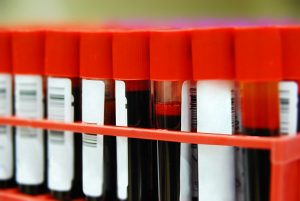 Norovirus and rotavirus ‘stomach bug’ infection risk may be dependent on blood type. A person’s blood type is determined by the genes inherited from the parents (genotype) and how individuals display a certain trait (phenotype). The study found that individuals with type O blood were most susceptible to the norovirus. When persons with type B or AB were infected they were more likely to be asymptomatic.
Norovirus and rotavirus ‘stomach bug’ infection risk may be dependent on blood type. A person’s blood type is determined by the genes inherited from the parents (genotype) and how individuals display a certain trait (phenotype). The study found that individuals with type O blood were most susceptible to the norovirus. When persons with type B or AB were infected they were more likely to be asymptomatic.
Individuals with type O blood may hold a higher risk for norovirus because those with type O have a receptor present in saliva that allows norovirus to latch on easier.
Advertisement
Essentially, anyone – regardless of their blood type – can contract norovirus, but symptoms may not be as severe in other blood types compared to those experienced with type O.
A previous study conducted by the Centers for Disease Control and Prevention (CDC) did not find a association between blood type B and added protection against norovirus. The study found that norovirus affects all blood types similarly.
There is currently no treatment for norovirus except for resting and staying hydrated. Furthermore, there is no preventative vaccine either. Symptoms of norovirus include nausea, diarrhea, upset stomach, and vomiting. Infected persons remain contagious up to 48 hours after symptoms have subsided. Generally, norovirus is not life-threatening, but it can cause complications in young children, seniors, and those with compromised immune systems.
Norovirus is commonly transmitted through the consumption of contaminated food or water, touching surfaces that are infected, or coming into contact with an infected person. Practicing proper hygiene and sanitation techniques can help lower the threat of the spread of norovirus.
Norovirus susceptibility by blood type
In one study, volunteers were infected with norovirus: 82 percent of them became infected while 18 percent did not. Of the 82 percent infected, one-third was asymptomatic and did not get sick, but they were still carrying and transmitting the virus unknowingly.
The study demonstrated that individuals with type B blood are less susceptible to norovirus, and type O persons are the most vulnerable for the norovirus threat. On the other hand, type O persons aren’t susceptible to all strains of norovirus and actually have a lower risk of catching some of them.
Overall, it would appear that certain blood types are more susceptible to certain strains of norovirus than others, but you should still enforce good hygiene and food preparation practices regardless of your blood type in order to reduce your risk.
Rotavirus and blood type connection
Another study has also suggested that your blood type may determine your risk of contracting the rotavirus – ‘stomach bug’. The results revealed that some rotavirus strains attach to A antigens present on the surface of cells in people with blood A and AB blood types. However, the strains that bind to A antigens are not the most common, so all blood types, really, are at risk of contracting rotavirus.
The researchers suggest that having a better understanding on how different rotavirus strains affect different blood types can help make better targeted treatment medications or improve the current rotavirus vaccine.
Norovirus and rotavirus infection prevention tips
All these studies and norovirus outbreak news may leave you feeling vulnerable to the norovirus threat. Don’t let the prospect of contracting norovirus take your peace of mind away. Following are the measures you can take to minimize your chances of getting sick from norovirus. Give them a try!
- Always wash your hands, especially after using the bathroom, touching raw meat, touching surfaces like handrails, and prior to eating or preparing food.
- Use alcohol-based hand sanitizers if soap and water aren’t readily available.
- Wash fruits and vegetables thoroughly.
- Keep sick children and seniors away from food that is being prepared or handled.
- If you are sick, do not prepare or handle food.
- Clean and disinfect surfaces, especially toilets, where vomit or diarrhea has occurred. The norovirus can survive on toilet surfaces for up to two days.
- Wash laundry thoroughly, and if laundry is soiled, wash immediately
Rotavirus infection commonly affects young children as they are more likely to touch the objects that may be contaminated and then put their fingers in their mouth. Symptoms of rotavirus include fever, vomiting, and diarrhea, and can last up to a week. Rotavirus can lead to dehydration as the body continuously expels fluid, so it’s important to stay well hydrated in case of a rotavirus infection.
Advertisement
Unlike many other viruses, rotavirus does have a vaccine available. Getting vaccinated against rotavirus can help lower your risk of contracting the virus. Aside from vaccination, frequent handwashing with soap and water is essential to ensure you don’t get sick.
Furthermore, refrain from putting your hands in your mouth, especially if you’re touching unknown objects, as you can easily become sick that way.
If you do get a rotavirus infection, drink plenty of fluids and get plenty of rest. The infection will simply have to take its course, but if the symptoms worsen progressively as the days pass, see your doctor or visit a hospital.
